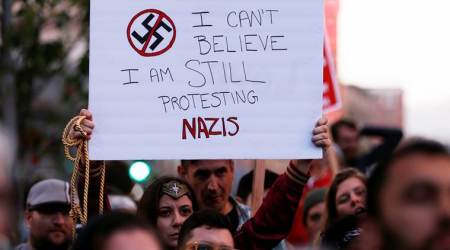 President Donald Trump no doubt pleased part of his political base on Tuesday by passionately arguing that both right- and left-wing extremists were responsible for violence at a white supremacist rally in Virginia on Saturday.
President Donald Trump no doubt pleased part of his political base on Tuesday by passionately arguing that both right- and left-wing extremists were responsible for violence at a white supremacist rally in Virginia on Saturday.
But his remarks, one day after he, under pressure, explicitly condemned neo Nazis and the Ku Klux Klan, left White House officials bracing for fallout from disappointed Republicans whose support he needs to govern in the coming months and years.
“Your base isn’t going to win you re-election … nor is it going to keep you a majority in Congress,” said one administration official. It was political reality that the controversy over Trump’s response would last for some time, he said.
The remarks at Trump Tower in New York on Tuesday that sparked that reality at times bordered on the surreal.
Trump pulled out the statement he read on Saturday in an apparent effort to show, despite the subsequent criticism, that his initial instincts that “many sides” had been at fault were correct.
“What about the alt-left that came charging at the … alt-right? Do they have any semblance of guilt?” he demanded, using terms that refer to right- and left-wing extremists.
He lashed out at the news media, a frequent foil, for its reporting about his reaction to the violence.
And he praised Susan Bro, the mother of 32-year-old Heather Heyer, who died after a car driven by a man reported to have harbored Nazi sympathies plowed into the rally opponents.
The praise, however, was for her warm remarks about Trump.
“Under the kind of stress that she’s under and the heartache that she’s under, I thought putting out that statement, to me, was really something,” the president said.
Trump’s political supporters embrace his style, and the Tuesday back-and-forth with reporters was an example of a characteristic that defines him, said a former adviser: a dislike for being criticized or pressured.
“When you push the president to do something, he’s not going to do it. He’s going to make a point not to do it,” said Sam Nunberg, a former campaign aide.
For now, the administration official said, the best strategy to deal with the fallout was to stay mum.
“Let’s just put a pin in it, and you know, not tweet, not comment any further,” he said. “Right now explaining is losing.”
Reuters





